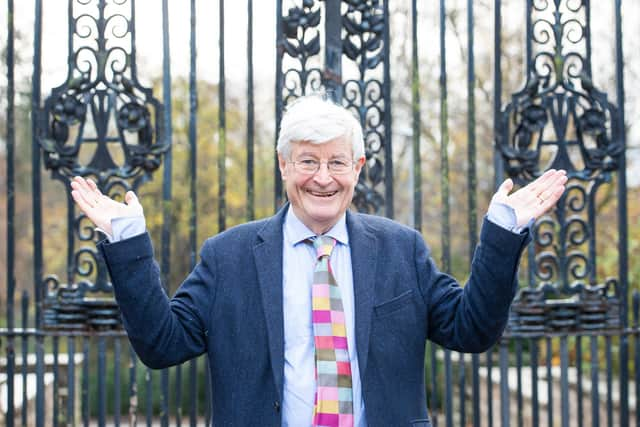Scottish Greens: Robin Harper quits but Humza Yousaf still remains tied to them – Murdo Fraser
The green cause – that of the environment and tackling climate change – is one that embraces all of us regardless of party allegiance. Our solutions may vary but the purpose is united: to save the planet. And yet at this moment of climate crisis, the Scottish Green party seems to limit its membership more and more. To embrace fewer and fewer even of its own members.
What once aspired to be a national, nay, global movement has narrowed into something of a sect. Or, perhaps, Patrick Harvie’s gang hut. In 1999, the sight of Robin Harper becoming the Green party’s first UK parliamentarian was iconic of Scotland’s new democracy. While I am clearly not of his politics nor his tradition I, too, rejoiced at the idea that we were starting something new.
Advertisement
Hide AdAdvertisement
Hide AdNow, however, the Scottish Green party, of whom he was the pioneer and standard bearer, cannot find a place for him. He has been driven out. Abandoned by that which he built. That strikes me as a deeply backwards step in both the style and substance of our politics.
Far from a new democracy and a fresh voice, the current Green party reeks of the sordid machine politics of the old Lanarkshire Labour party for which Labour is still paying a price. It’s Harvie’s way or the highway – and without a cycle lane. Personality politics by clique.
Harper is not the first elected Green politician – admired and respected by rivals of all parties and none – to fall foul of the Harvie politburo. Andy Wightman is a man with whom I often had profound disagreements, but whose integrity and assiduity I never questioned. He was undoubtedly an asset to a diverse Scottish Parliament who was forced out by the Scottish Green leadership because his openness to hearing alternative points of view – in his case, on the trans issue – did not meet with their increasingly narrow view of diversity.
‘Green’ can mean something fresh. It can also mean something that has gone off. I suggest Harvie’s ‘Green’ is somewhat fetid. He is a politician who has long indulged in virtue signalling but who now seems to be a judge of the virtue in others, and his definition of it is getting ever narrower.
Harvie dismissed Harper’s resignation as “curious” since, in his belief, the Scottish Greens have never been more successful, as both his and Lorna Slater’s backsides nestle in the rear of a ministerial car. But, as Alex Salmond so scathingly swiped at Nicola Sturgeon during his eulogy to Winnie Ewing, being in office means little unless you do something positive with your power.


The record of the Greens in government has been exclusively – and spectacularly – disastrous. Harvie’s reforms to the private rental sector have created shortages and driven rents sky-high, the exact opposite of the intended outcome. The policy of highly protected marine areas has had to be shelved due to a massive public and political backlash.
SNP backbenchers blame the influence of the Greens for the failure to progress dualling of the A9 and A96. And perhaps most significant of all, Harvie’s co-leader Lorna Slater presided over the multi-million-pound disaster that was the failed deposit return scheme. Harper advanced the green cause without ever being in government while Slater has made it synonymous with expensive, high-pitched, hectoring failure.
Genuine members of the Scottish Greens who believe in environmental causes must surely question Harvie’s definition of success and whether or not he is genuinely promoting their cause. And, without question, SNP MSPs doubt what benefits he is bringing to their unnecessary coalition of nationalists. Increasingly senior figures in the SNP seem to be calling on Humza Yousaf to do some pruning of those who are contemptuously dismissed as their “gardening wing”.
Advertisement
Hide AdAdvertisement
Hide AdThe Greens’ attacks on that nationalist stalwart, Fergus Ewing, have not gone down well with the SNP rank and file. The ambitious SNP Westminster leader Stephen Flynn and the potential leadership candidate Neil Gray have started grumbling about the influence that the Scottish Greens have on Scottish Government policy. Gray, the Cabinet Secretary with responsibility for the economy, finds it hard to answer this simple question: as ordinary Scots struggle in the cost-of-living crisis, why is the Scottish Government tied to a party that is actively hostile to economic growth?
Yousaf’s narrow victory over Kate Forbes in the SNP leadership contest was put down to him being the ‘continuity candidate’ to follow on from Sturgeon’s leadership. In just a few months, her record appears rather yellowed. Now with his party leaking support in the polls, Yousaf’s challenge is to show some leadership and bring about some change. The best way he could do that is by ditching the Greens.
Harvie’s commitment to separation does not seem to stop at separating Scotland from the rest of the UK. He can even separate members of his own party from the Green cause.
It is indeed strange that if the climate crisis is the imperative that all of humanity must address, the leader of the Scottish Greens demands the right to decide who is good enough to join the fight. As both Harper and Wightman can attest, tolerance is not one of the virtues of the Scottish Green party under Harvie’s leadership.
The question for the SNP and for Yousaf is: how much longer can they put up with the intolerance and incompetence of Harvie and his colleagues, who are simply dragging the Scottish Government down?
Murdo Fraser is a Scottish Conservative MSP for Mid-Scotland and Fife
Comments
Want to join the conversation? Please or to comment on this article.
